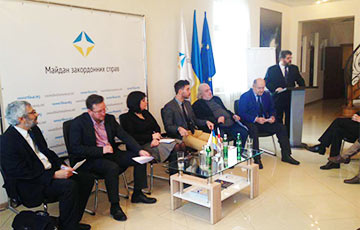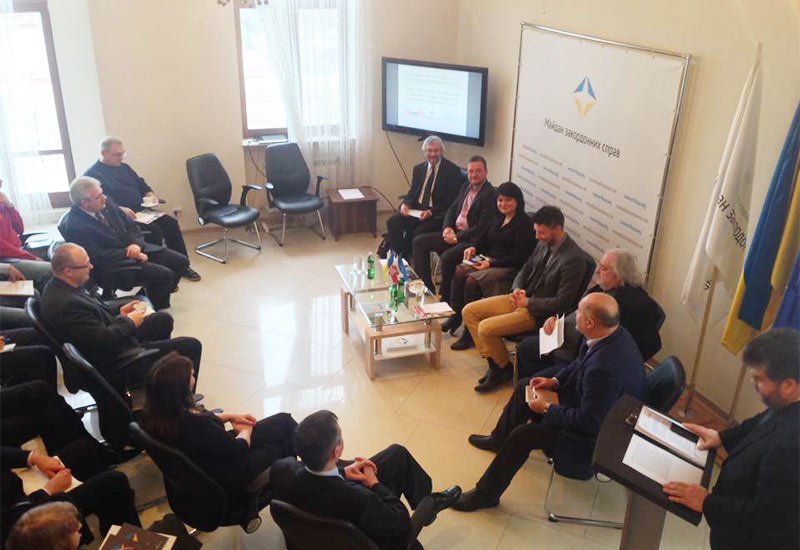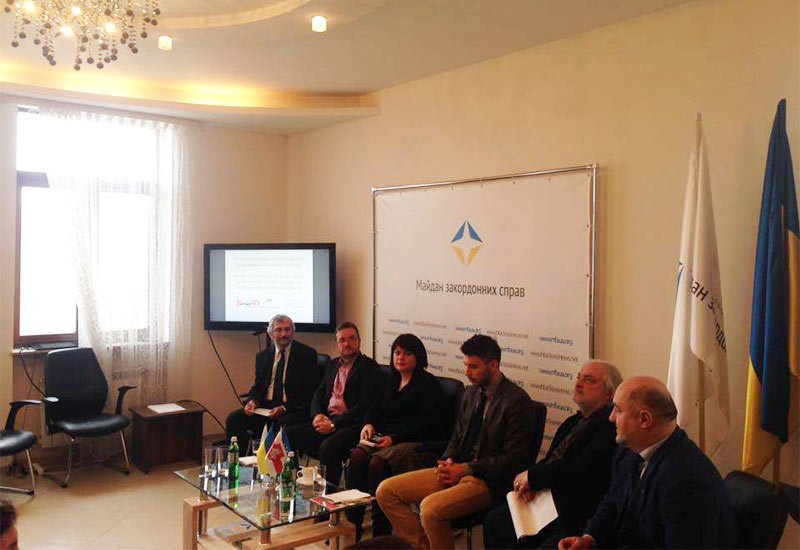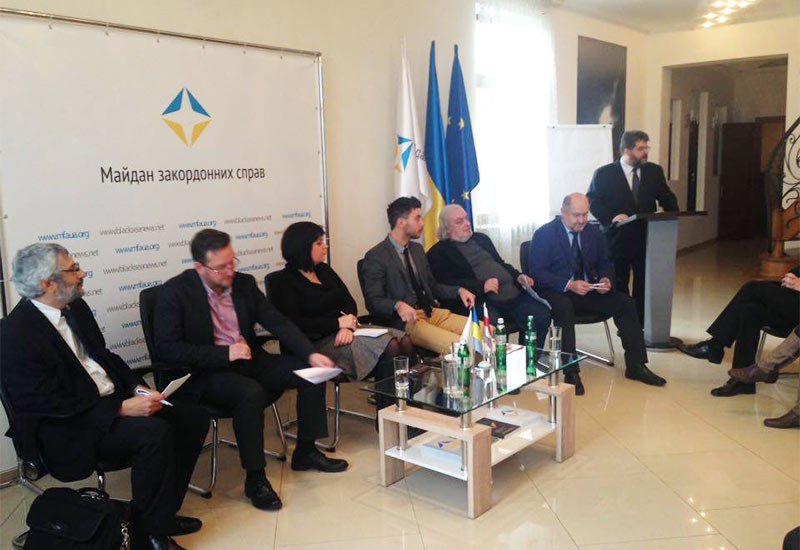Conference in Kyiv: Lukashenka a true African dictator
- 23.11.2015, 16:54
- 2,256

The European Union must have a clear strategy for Ukraine and Belarus.
On November 17, Kyiv hosted a conference "Belarusian Challenge in European and Ukrainian Foreign Policy" organized by the Belarusian Foundation Charter'97 and the Ukrainian company "Maidan of Foreign Affairs" in the framework of the Visegrad Fund. The event was attended by the following speakers: Ukrainian diplomat and head of the "Maidan of Foreign Affairs" Bohdan Yaremenko, director of the Slovak Institute for Public Policy Gregory Mesezhnikov, analyst and program coordinator of the Polish Institute of Public Policy Lukasz Wenerski, Belarusian international observer Roman Yakovlevsky, coordinator of the civil campaign "European Belarus" Zmitser Bandarenka , editor in chief of charter97.org website Natallya Radzina, and an expert of "Maidan of Foreign Affairs" Oleg Belokolos. Also the conference was attended by experts of leading analytical centers of Ukraine, foreign diplomats, representatives of the authorities and journalists.
Director of the Slovak Institute for Public Policy Gregory Mesezhnikov criticized Brussels' approach to the solution of the Belarusian problems.
"When dealing with Belarus, the European Union takes into account the specific conditions that exist in the country. I do not want to hide my, to put it mildly, skeptical attitude toward the latest steps of Brussels towards Minsk. I have already had occasion to speak out on this topic. It must be remembered that the EU is a union of states built on certain values. Naturally, the question of practical politics, or the so-called pragmatism, geopolitical considerations are very important. But the European Union would not exist in the form it exists now, had the fundamental principles laid down in its foundation not been applied in respect of the states that entered it after 2004.
Slovakia is a typical example. The development of the country from 1993 until 1998 did not correspond to the concepts and criteria necessary for joining the EU. I witnessed how the democratic conditionality of the eventual membership was applied. If the EU at the time deviated from its principles, it is unlikely that the country's population, which was mostly pro-European, would be able to carry out democratic reforms. We were set clear conditions, and it was a signal, first of all to the public, to the democratic part of the political spectrum. The changes that occurred then were motivated by the desire to overcome the difficulties that Slovakia faced before its entry into the European Union.
What do we see in relation to Belarus? Its relations with the European Union were mostly affected by the repressive domestic policies. Brussels decided to apply certain sanctions against Minsk. We mean the measures that were restrictive. If we consider a large-scale introduction of sanctions, this certainly was not the case. These measures became a signal that Belarus does not meet the requirements needed to participate in the Eastern Partnership. We see that the recent "election" was characterized by the OSCE as inconsistent with criteria of freedom and democracy. Nevertheless, the EU has decided to suspend the sanctions."

Gregory Mesezhnikov stressed that the European Union should keep to the values in its relations with dictators.
"In recent years, authoritarian regimes have tried to, without really changing and retaining their essence, to bring in some elements of hybrid nature in its development. First of all, they are external ones, he said. The EU is currently facing a choice: how to treat the States which, he believes, show certain changes in their internal and foreign policy, but in fact remain the same. How to assess this situation?
I think that the European Union should stick to the values. It is not a hybrid organization. The EU cannot become a community dominated by pragmatic considerations."
The international analyst Roman Yakovlevsky reminded those present about the strengthening of military cooperation between Moscow and Minsk.
"In the last month there was a series of events that will be fateful for Belarus, - he said. Moscow hosted a meeting of the joint boards of the Ministries of Foreign Affairs and Defense of the two countries, as well as a private meeting of heads of the Security Councils, where a cooperation agreement was signed, the essence of which is known only in general terms. All of this is presented as an event within the framework of the so-called "Union State", which is not a subject of international law. In my view, this cooperation is for the benefit of Russia. As for the board of the foreign affairs agencies, the mainly thing appearing after this meeting was the statement of Uladzimir Makei that Belarus fully supports Russia's actions in Syria. We can only guess why it had not been done earlier. I think, in Moscow, he simply got strong-armed.
The main conclusion after the meeting of the Defense Ministries was what the well-known General Sergei Shoigu said about the unified military organization of the "Union State". It was considered appropriate to strengthen the Russia-Belarus regional grouping, but not at the expense of the Belarusian army, and by some military units of the Russian army. The events held in Moscow, I believe, should be crowned with such an important event as the meeting of the Supreme State Council of the "Union State".
Yakovlevsky also said that recently the military theme in the Belarusian television as the mass propaganda tool has been prevalent. In his opinion, this is evidence of the agitation of the ruler and his true attitude towards the conflict in Ukraine.
"During his "inauguration" Lukashenka in the Arkady Raikin style was first dressed in civil clothes and then managed to change and appeared wearing a military cap. It turns out it is in such a strange attire that man begins to talk about the threat of war, said the expert. In this case, Ukraine was not just implied. For the first time in recent years from Lukashenka and his Minister of Defense began using the term "coup" about the events in Kyiv - exactly what we hear from Moscow. Previously, this was not the case. This unpleasant fact is an evidence of the true "peacekeeping" Lukashenka in the war between Russia and Ukraine.
I would like to mention another statement by the Minister of Defense. Andrei Raukou said that Belarus began to prepare for a hybrid war already 15 years ago. This raises the question: "In what capacity?" Fifteen years ago, such term was not even in use. It turns out that they all have long known about it.
Russian embassies in a number of neighboring countries held events at which they clarified what a "Union State" is. On October 2, it was held in Vilnius. The Russian Foreign Intelligence was represented by General Grigory Rapota - secretary of the "Union State", and from Belarus - First Deputy Minister of Foreign Affairs. Thus, today we see the Kremlin's strategy towards Minsk. It is not just aimed at making Minsk a subordinate, but at acquiring the Belarusian power and defense units.
Analyst and Program Coordinator of the Polish Institute for Public Policy Lukasz Wenerski explained why Europe's interest in Belarus has been decreasing.
"When I look at what is happening in the European Union policy in relation to its current problems, namely, the Greek crisis and the refugees, I see that the Eastern Partnership has "fallen" sharply among the priorities, he said. Maybe it is not noticeable from Warsaw, but it is already clear from Berlin. Let's look at the discussion of the sanctions against Russia. They were introduced in connection with the annexation of Crimea and the war in Donbas. What are the EU partners expecting now from Russia to lift sanctions? Only the implementation of the Minsk Agreement. And what it means is not completely understood by anyone. Maybe holding elections in Donbas would be enough. How they will be held is not so interesting any longer. It is only important that these agreements are implemented.
The same applies to Belarus. It is much lower in priority than Ukraine. I think that EU leaders were simply waiting for some action from Lukashenka to be able to lift the sanctions and give him money. There were strong expectations that during the "elections" in Belarus everything would be quiet. The European Union, because of the current geopolitical situation and problems with refugees, is interested in creating "stability zones" - so that there were no problems or, God forbid, another Maidan."

The coordinator of the civil campaign European Belarus Zmitser Bandarenka spoke about the modern history of Belarus, murders of the opposition leaders, the dispersal of the Supreme Council and the stages of the dictatorship.
"Did Europe see Belarus as a challenge at the time? I do not know, said the politician. But there were some doubts. In September 2009, after Belarus began a policy of the so-called "liberalization" and after the international non-recognition of South Ossetia and Abkhazia, Minsk received a loan from the International Monetary Fund. Ukrainian President Viktor Yushchenko declared proudly that he is a "lawyer of Lukashenka" and his personal friend, and that he helped in lobbying for this project. Also lobbying and being loud about the project was Georgian President Mikhail Saakashvili.
At first Belarus received $2.5 billion, then another 1.5 billion, followed by the loans from international private banks. It would seem that all was well, Belarus "was heading" away from the dictatorship, prisoners were freed under pressure from US sanctions. But then happened major Belarus-Russia military exercises "Zapad 2009". I then protested against them, we were harshly beaten, sentenced to administrative arrests and fines. Then it turned out that these exercises practiced a tank breakthrough into Kaliningrad and a nuclear strike on Warsaw.
We were told: "Why are you protesting, everything is good now." And I knew that if Russians came (and then Russian paratroopers and tank units entered the territory of Belarus), they will not all come back. Indeed, it was reported that some of them stayed on and are serving in the Belarusian military uniform.
When the former Polish Defense Minister Romuald Szeremietiew publicly stated that according to the Polish intelligence the exercises simulated a nuclear attack on Warsaw and a breakthrough into Kaliningrad - Europe for the first time realized that it can be a challenge."
Dmzitry Bandarenka warned Western countries from financing the dictatorship which stays a true military ally of Russia and spoke of the strategic geopolitical significance of Belarus.
"Lukashenka said that in addition to Polonez which the Belarusian army already has, it is necessary, first of all, to supply Belarus with Russian planes and missiles instead of a military base. This was also stated by the Defense Minister of Belarus: "We understand the threat from Poland, we do not need Air Force base, give us missiles that could reach all the four NATO bases, which are now formed on the territory of Poland." Why create an air base today, if there is no border with Russia, we can have hundreds of Russian aircraft land at once. But they all say: it is necessary to give money to Lukashenka, who is also against the Russian airbase.
And it is now - not in 1996, not in 1999, when our leaders were murdered, not in 2009, when before the election came Radoslaw Sikorski and Guido Westerwelle who promised to give Lukashenka more money - only now has everyone finally realized what the military of all countries and nations have known for a long time: Belarus is a key strategic geopolitical military area, very convenient and very stable.
The function of Belarus - Litva, as we used to be called - has always been to be the guardian of "Smolensk Brahma." When the Great Litva held this bridgehead, it was a stabilizing state in the eastern part of Europe, with France in the western part of this country. We held the bridgehead. But then as soon as Russia has taken his, expansion went in the opposite direction, because there are no more barriers before the Vistula."
The Chief Editor of charter97.org Natallya Radzina spoke of the need for the information policy of Ukraine towards Belarus.
"Yesterday, I was asked during the TV interview: "What should Ukrainians do?" said Natallya. I can say that they should definitely strengthen the border in the north, because the information that there are Russian troops on the territory of Belarus appears regularly. Those were both Russian troops that could remain after the Russia-Belarus maneuvers in previous years, and those who come just to the Homiel region, on the border with Ukraine, and conduct reconnaissance of the area.
In addition to the military component, I, as a journalist, would also mention the information policy, which today Ukraine needs to have in respect to Belarus, since, according to sociologists, 60% of citizens support the actions of Russia in Ukraine. There are mostly Russian channels broadcasting in the information field of Belarus, because more than 20 years ago Lukashenka destroyed the independent media.
Belarusian propaganda is not much different from the Russian one. The amount of anti-Ukrainian propaganda could be smaller, but, as Roman Yakovlevsky noted here, today the events in Ukraine and Euromaidan are called "coup d'etat". Belarusian propaganda has adopted the rhetoric of Russia.
This situation is extremely dangerous for Ukraine, because, if the number of Belarusians who support the actions of Russia in Ukraine reaches 80-90%, you'll have another thousand kilometers of the front. No one would ask Lukashenka, if a Russian base should be placed in the country. Basically, nobody is asking him now either. But we can say that if it happens, even a partial independence of Belarus from Russia will be out of question."
Natallya Radzina stressed that in Belarus there are very few media outlets that are telling the truth about the events in Ukraine, just as Ukraine does not have the media, which would tell the truth about Belarus.
"This is a disaster, because the Ukrainians do not know what is happening in the neighboring country, she said. Yesterday I was asked: "In Belarus there are no oligarchs - it is good, isn't it?" Yes, we have one big oligarch, who controls absolutely everything. How is this situation better? It seems to me that it isn't.
We know that last year there was a meeting of Lukashenka and Poroshenko, and it was agreed that Belarus will have Ukrainian TV channels. They are still not available in Belarus. If Belarus had a broadcast of at least one Ukrainian TV channel, it would have completely changed the situation. The next step, as we said, is introduction of FM-radio stations on Ukraine's border with Belarus, which would deliver information primarily on Ukraine for the Belarusians. Support is needed for projects, websites, newspapers that write about Ukraine. It is necessary to speak about a serious information policy. We understand what difficult situation you are now in. You have international partners. Talk to them about how important it is for Belarusians to know about the situation in Ukraine. Stability and security of Ukraine will first of all depend on whose side Belarus will be.
Today, the situation in Belarus is controversial. There is an economic crisis in the country. The loans that Lukashenka can get from the West, will not save the situation. Most of these loans will be used to pay interest on old debts. Russia is not able to fully support its dictator - the way it did for more than 20 years. He will not implement any political or economic reforms, which are required of him by the West, because for him it would mean an actual loss of power. Therefore, there may be some social unrest. And in this situation it is very important to support the democratic opposition, because the change of power is indeed possible."

Expert of the Ukrainian public organization "Maidan of Foreign Affairs" Oleg Belokolos criticized Kyiv's cooperation with authoritarian regimes. He also stressed that in the current situation the EU should pay more attention to Belarus and Ukraine.
"What kind of foreign policy are we conducting today? We visit Kazakhstan and Turkmenistan - the countries that did not support our territorial integrity in the UN, he said. So what kind of foreign policy are we talking about? We conducted this foreign policy for 23 years. It ended up with a part of our territory taken away from us. Nobody would give us weapons, we have no friends. And this policy, unfortunately, is continued by Petro Poroshenko.
We believe that foreign policy should be based on values. Ukraine should determine the level of its cooperation with other countries by the level of protection of human rights in them. We cannot have a strategic partnership with the countries that are leaders in the field of human rights protection and with the countries where there are serious violations. This is not just a slogan or some abstract things. Authoritarian regimes - and we see it every day in the case of Russia - are a threat to Ukraine.
Lukashenka is a one hundred percent African dictator of the modern kind. Clever manipulation of the media, of the electoral process with the formal fulfillment of its external demands, elimination of opponents - in the guise of criminal investigations or physical one - are the classic signs of an African dictator. It is a one hundred percent match.
The EU should play a more active role in the region. It will be natural that the "old" Europe will be distracted by the Middle East. For a long period of time or for a short period, but it will happen. Therefore, in this situation, our neighbors - members of the European Union - should pay more attention to Ukraine and Belarus."








